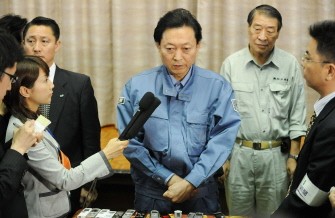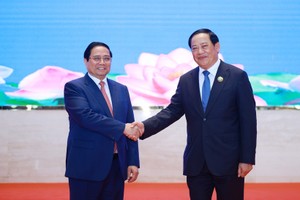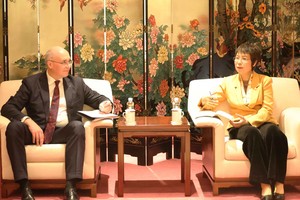TOKYO, June 1, 2010 (AFP) - Japan's embattled prime minister insisted Tuesday he would stay in his job despite press speculation he may step down ahead of upper house elections next month.
Centre-left leader Yukio Hatoyama, who took power in a landslide election last August, has seen his approval ratings slide below 20 percent amid a row over a US military airbase on the southern island of Okinawa.
His U-turn decision to keep the unpopular base on Okinawa despite strong local opposition has caused a split in his three-party coalition, with the small, pacifist Social Democrats bolting the government on Sunday.
Newspaper front-pages Tuesday said Hatoyama faced growing calls from within his Democratic Party of Japan (DPJ) to quit.
The premier on Monday night met with political heavyweight Ichiro Ozawa, the DPJ secretary general who is often described as the party kingmaker and power behind the prime minister's throne.

Hatoyama, who was expected to meet Ozawa again later Tuesday, signalled that he wanted to stay on in his post, telling reporters: "I want to cooperate with him (Ozawa) to tackle national challenges."
Local media, quoting party sources, said the two would discuss whether Hatoyama should resign ahead of an election for the upper house of parliament expected on July 11.
"I really work hard but I have yet to gain the people's understanding," the premier said Tuesday while visiting cattle farmers hit by an outbreak of foot-and-mouth disease in southern Japan.
"Reflecting on that, I want to have firm talks with the secretary general."
The premier's right-hand man, Chief Cabinet Secretary Hirofumi Hirano, ruled out Hatoyama's resignation.
"I think it is unreasonable in the first place that people should talk about whether the prime minister should stay or leave," Hirano told reporters.
But many analysts say Hatoyama is in a tough spot.
"His resignation is a matter of time," said Koji Nakakita, professor of politics at Rikkyo University in Tokyo.
"He has lacked leadership. The DPJ needs coalition partners, but no party wants to join under Hatoyama. Since the approval rate has plunged to such levels, he has no option but to step down."
Cabinet ministers professed their loyalty, even as they spoke about the government's deep troubles.
Deputy Prime Minister and Finance Minister Naoto Kan -- seen as among the likely contenders for Hatoyama's post -- said: "I have been saying I want the prime minister to fulfil his duties for the full four-year tenure and my thinking hasn't changed."
But Kan also said Hatoyama's handling of the Okinawa issue had damaged the government, telling journalists: "I believe almost everyone in the DPJ shares the view that we are in a very severe situation."
Foreign Minister Katsuya Okada said: "The support rate for the DPJ has declined, and both the secretary general and I feel the wind blowing against us.
"But I think it would be wrong to think the party would be alright if we changed the leader."
Transport Minister Seiji Maehara, another possible contender for the premier's job, said support for the DPJ had diminished in part because both Hatoyama and Ozawa have been embroiled in political funding scandals.
But he also stressed the need for continuity in leadership. "It's problematic if the prime minister is replaced frequently, so I want the prime minister to reflect on his past conduct and work hard."
Hatoyama is Japan's fourth premier in four years.
Shizuka Kamei, the minister of financial affairs who is leader of the DPJ's remaining coalition partner, the tiny People's New Party, said: "I'll support him (Hatoyama) with my utmost efforts."
























